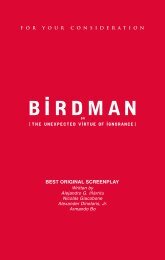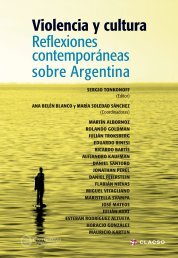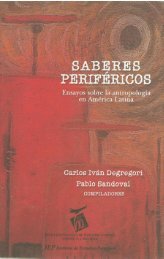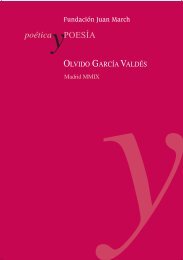blueprints
blueprints
blueprints
You also want an ePaper? Increase the reach of your titles
YUMPU automatically turns print PDFs into web optimized ePapers that Google loves.
198 | toolkit: an idea, a pencil, and paper<br />
In his essay, Luis Rodriguez writes powerfully about how he came to<br />
poetry after leaving prison and how this experience led to his making a<br />
connection between poetry and freedom. “The first move from chaos isn’t<br />
order,” he writes, “—it’s creativity.” Through his work with Tia Chucha’s<br />
Centro Cultural & Bookstore, he comes to understand the transformative<br />
power of poetry in drawing together the members of an underserved community<br />
and in connecting that community with the values of freedom and<br />
civic discourse. He tells of one young woman in his neighborhood who<br />
was literally saved from taking her own life and so restored to herself and<br />
her community through an accidental introduction to the Centro.<br />
Patricia Smith talks about how the Chicago slam provided her with a<br />
passionate experience with poetry and connected her with a larger community.<br />
In particular, she recalls how Gwendolyn Brooks, who served as a<br />
sort of presiding spirit for a memorable Chicago event, helped her understand<br />
how she could express her experience as a young, African American<br />
woman from Chicago’s West Side—and how she could do so as a member<br />
of a larger poetry community.<br />
And Sherwin Bitsui writes about poetry as the vehicle uniquely able to<br />
help young Navajo students connect with school by encouraging them to<br />
bring the rich language and stories of their own culture into the classroom.<br />
Rodriguez, Smith, Bitsui, and Boskoff have the experience of working<br />
with and in communities in which people may feel isolated and alienated,<br />
socially or geographically, by poverty or segregation or other factors. In<br />
these cases, poetry itself isn’t the point so much, at least at the beginning; it’s<br />
more a means to an end. In a way, isn’t it always? Even those of us who are<br />
animated by a passion for poetry are so animated because we’ve had the<br />
experience of poetry’s power to change our lives and our relationships with<br />
our world and ourselves. But to achieve any of these ends, we still have to<br />
create the conditions for the intimate experience that is poetry. We still<br />
must come to the question: How does one create the conditions for the<br />
“falling in love,” for the restoration to self and thus, perhaps, to community,<br />
to occur?<br />
Recognize that your passions and your values are intimately connected<br />
Articulating what you are passionate about and why can help you identify<br />
and articulate your values and perhaps answer the next question: Why<br />
me? Do you value and want to create the conditions for individual, transformative<br />
experiences with poetry? Do you value and want to create a







